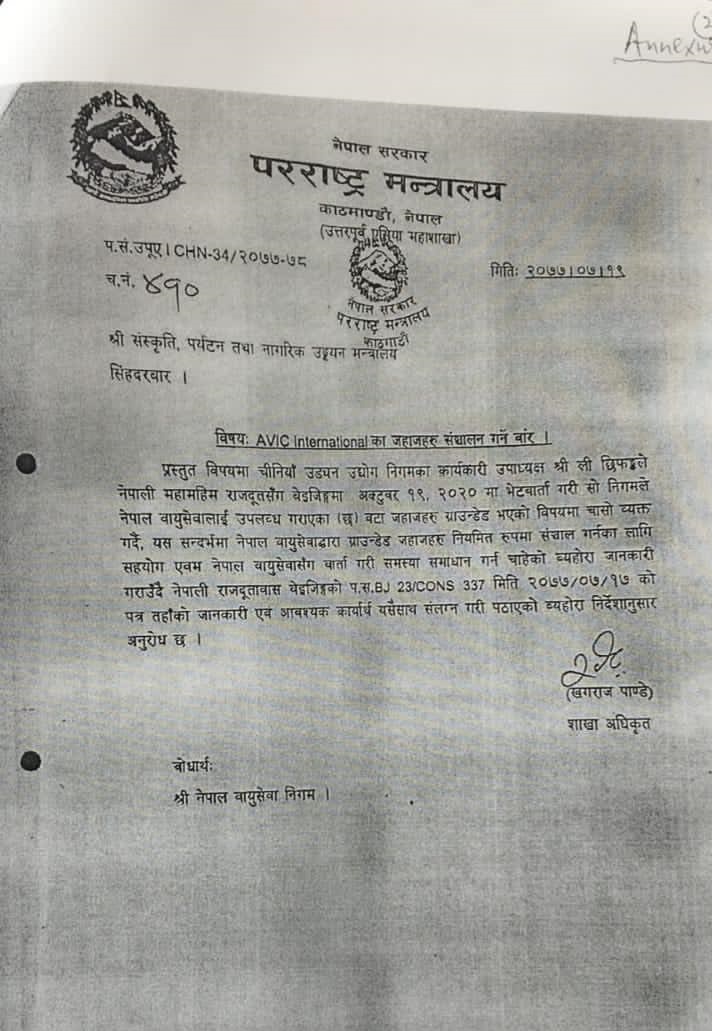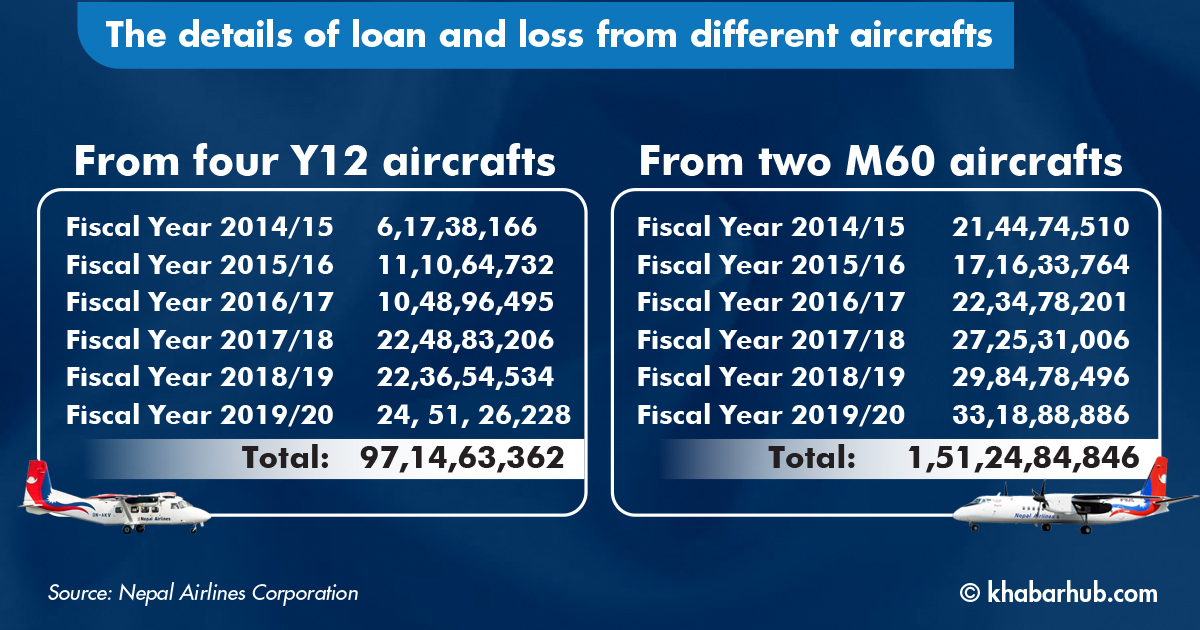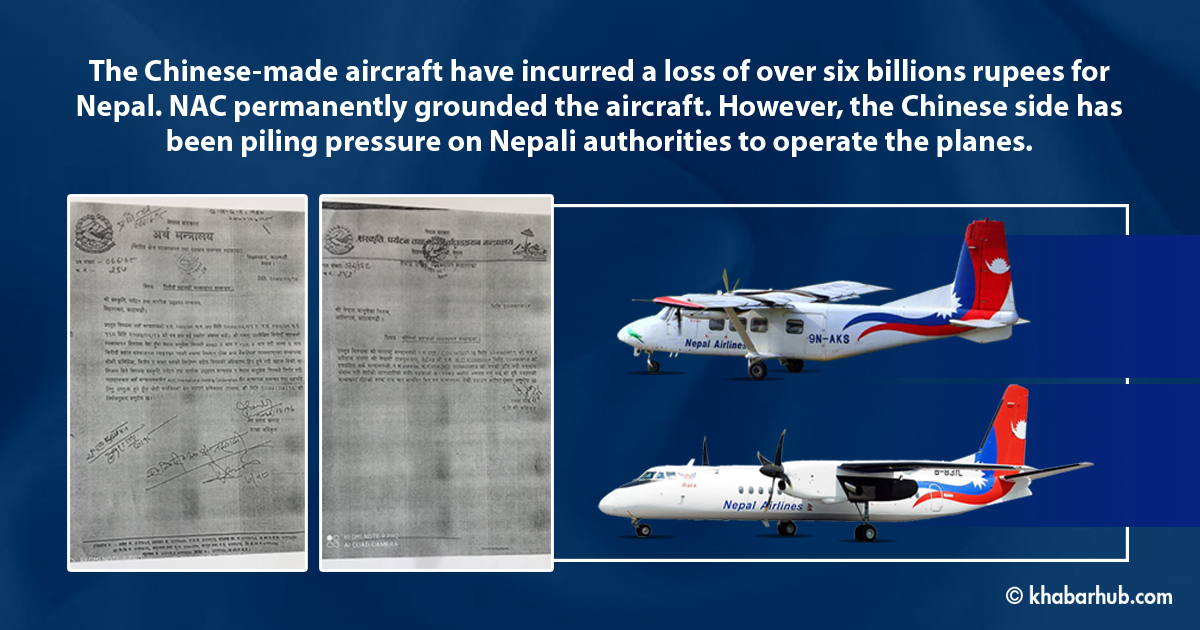KATHMANDU: The Nepal Airlines Corporation (NAC) is suffering for the consequences of the procurement of Chinese aircraft that cost billions of rupees.
The NAC is now paying the heavy price for the procurement of the Chinese planes, which means that it is draining out money after bad.
The six Chinese aircraft procured spending more than Rs 6 billion have caused heavy loss to the corporation in the last six years.
After incurring a loss of more than Rs 1.9 billion in five years, Nepal Airlines decided to ground six Chinese planes including two aircraft brought in donation and four procured planes from July 30.
The aircraft have been grounded for more than three and half months now, however, the NAC is still compelled to spend Rs 12 million per month as parking charges and insurance.
NAC incurring loss both ways
The Chinese planes have ruined NAC both ways incurring a heavy loss both in operation or while grounded.
The Corporation has incurred a loss worth Rs billions while procuring is bound to bear the loss while grounding them.
The NAC board of directors that decided to ground the ‘always-at-loss’ aircraft three and a half months ago is still undecided to manage these planes.
According to NAC sources, the Corporation has to spend Rs 2,514 as parking charges and the US $ 1,061 for insurance for MA-60 in a day.
Likewise, for the Y-12 aircraft, the airport office charges Rs 685 and US$ 315 as insurance charges per day.
It may be recalled that a Chinese-made Y-12 aircraft operated by NAC had on March 28 this year landed some 60 meters short of the runway at the Nepalgunj Airport and skidded on the nearby grassland.
Thus, the NAC has spent Rs 43 million for parking and insurance in the grounded period of three and half months which means that the NAC has paid a total of Rs 42 million for the insurance and one million for parking in the last three and a half months alone for six planes.
In addition to it, the corporation has borne the cost of engineers and pilots as well.
It’s been more than three months that NAC has requested the Ministry for Culture, Tourism and Civil Aviation for convenient management of these aircraft.
According to the Ministry source, it has sought the consent of the Ministry for Finance for it.
Yet, the NAC has not received any encouraging decision from both the Ministries.
However, Dim Prakash Paudel, the Managing Director of NAC claims that efforts have been initiated to manage the aircraft.
“As the Board of Directors of the Corporation alone cannot decide the management of the aircraft, we have written to the line Ministry,” MD Paudel said, “The process is underway.”
Despite the Corporation’s appeal for facilitation, neither the Finance Ministry nor the Ministry for Tourism, Culture and Civil Aviation seems to have taken a substantive step in the direction.
The NAC has demanded the Ministries either to help in the arrangement of those planes or to make room for NAC to handle it on its own.
China piling pressure to operate the aircraft
NAC sources reveal that despite the Board of Director’s decision to not fly the Chinese aircraft for good, the Chinese officials have been heaping pressure on the NAC officials asking them to resume the flights.
Concerned about the idea that NAC’s decision not to fly Chinese planes could send a negative message and blur the image of Chinese aircraft, the Chinese officials have been putting pressure to operate the aircraft at any cost.
It is interesting that when the teams from Bangladesh and Nepal traveled to China to inspect the aircraft back in 2011, the team from Bangladesh had rejected the Chinese aircraft. Kathmandu’s experts, unfortunately, recommended them due to greed for commission.
Sources said that the Nepali team had submitted a false report to the government comparing the Y-12 aircraft with Twin Otter and MA60 with ATR-72.
The Chinese Ministry also sent a letter to Nepal’s Ministry for Civil Aviation expressing its concern about the operation of six Chinese aircraft.
The letter states that Lee Xi Fang, the Executive Vice Chairman of China Civil Aviation had met with Nepali Ambassador in Beijing and had requested him to resume services through the Chinese aircraft lying grounded for a long time.
NAC sources said they have been getting the pressure even now.

More than five billion rupees wasted
NAC has borne around two and a half billion rupees from four Y-12 and 2 MA 6000 aircraft in the duration of nearly six years.
From the fiscal year 2014/15 to 2019/20, the corporation witnessed the loss of more than 2.483 billion rupees from six Chinese planes only.
Besides, the NAC has a loan worth Rs 3.14 billion taken for the procurement of these planes.
The sum of the loss and loan Chinese aircraft cost to NAC turns out to be more than five and a half billion rupees in the period of six years.

The NAC says the decision to ground the Chinese aircraft was purely because of the loss that has been incurred.
Achyut Raj Pahadi, a board member of the Corporation, says, “These six ships are useless.”
He adds that such aircraft have not been bought or sold anywhere in the world except for the G2G (Government-Government) purpose.
According to him, the decision to ground the aircraft was aimed at stemming the losses caused by the Chinese-manufactured planes.
NAC sources, meanwhile said, there are other reasons as well for grounding the aircraft. One reason to ground the Y-12 aircraft is because of the unavailability of trainer pilots, the training cost being four times more than the Twin Otter, and the lack of training slots.
Similarly, the reason behind the closure of MA-60 aircraft is owing to the repeated simulation training expenses which are 78 percent higher than other aircraft.
Likewise, the type rating training is also 50 percent higher than that of other aircraft, and the payload ban of up to 30 percent in the operating sector outside Kathmandu.
Besides, problems were seen on the engineering side as well. According to Pahadi, the Corporation has increased its capacity to support OEMs in ship maintenance, however, the Chinese company did not cooperate for maintenance.
Although the corporation received spare parts as per the agreement, most of the spare parts were made in China and the flight had to be canceled due to non-availability in the international market.
The Corporation had procured six aircraft from China as per the agreement reached between China and the Government of Nepal in December 2013.
Pahadi said the NAC had purchased the aircraft from China with an investment of Rs 6.67 billion in concessional loans.
Out of the total amount, Rs 2.94 billion was grant assistance and Rs 3.72 billion was on an annual loan of 1.5 percent.
Under the grant, China had provided a 56-seat MA-60 aircraft to Nepal in 2071 BS and an 18-seat Y12-E aircraft for remote flight in October, the same year.
The rest of the concessional loan aircraft were brought at different times. As per the agreement, the Corporation had brought the first MA 60 aircraft in 2071 BS and Y-12 aircraft later the same year.
Both aircraft brought in for the first time were subsidized.
The two aircraft — MA 60 and Y-12 — were brought in 2073 BS. Similarly, the Corporation had brought the remaining two Y-12 aircraft in 2074 BS as per the agreement between the two governments. Those aircraft could not fly at its full capacity for even a single day.
The Corporation could not fly six aircraft owing to lack of manpower because of which the Chinese aircraft to bear a loss of more than Rs 5.5 billion in six years.









Comment